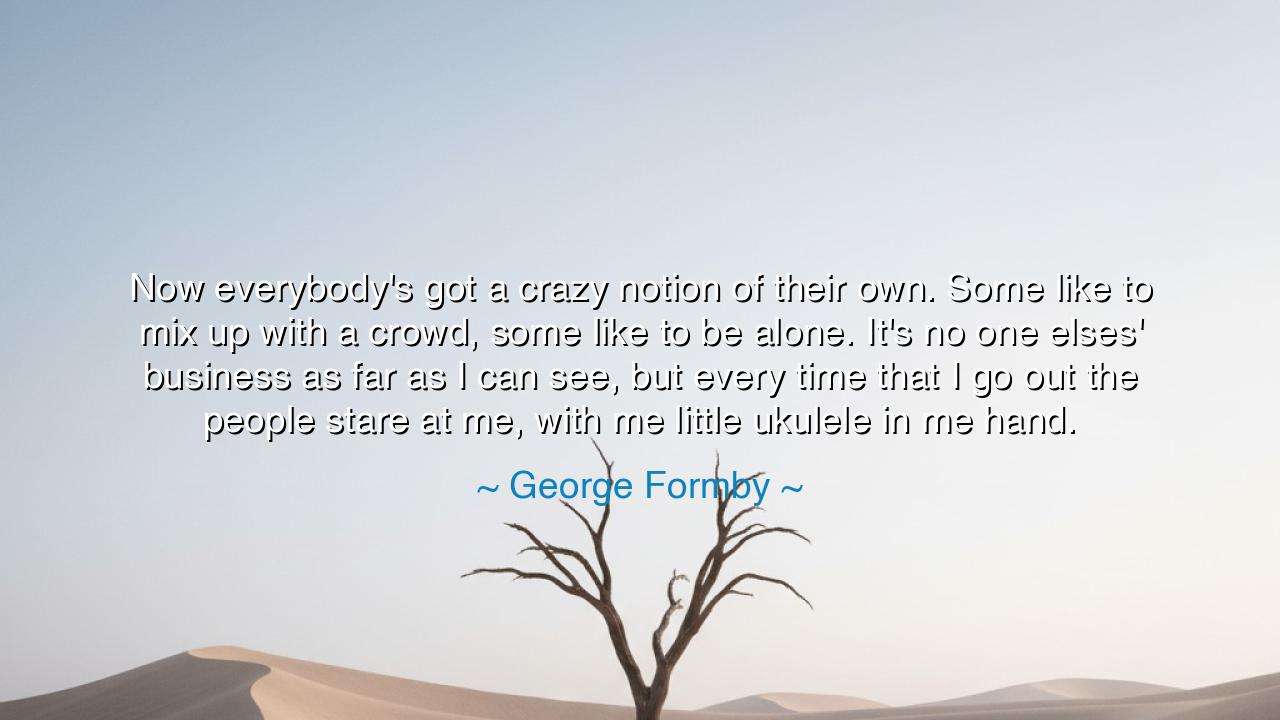
Now everybody's got a crazy notion of their own. Some like to mix
Now everybody's got a crazy notion of their own. Some like to mix up with a crowd, some like to be alone. It's no one elses' business as far as I can see, but every time that I go out the people stare at me, with me little ukulele in me hand.






"Now everybody's got a crazy notion of their own. Some like to mix up with a crowd, some like to be alone. It's no one else's business as far as I can see, but every time that I go out the people stare at me, with me little ukulele in me hand." These playful words by George Formby hold a deeper truth about the nature of individuality and the human tendency to judge and label others. At the heart of this quote lies a reflection on the freedom of self-expression and the inherent contradictions that arise when one dares to be different in a world that often seeks conformity. Formby, in his characteristic wit and lightheartedness, points to the way society often reacts to those who choose a path that does not align with mainstream expectations. His little ukulele becomes not just an instrument of entertainment but a symbol of individuality, a defiance of societal norms, and an expression of his unique spirit.
In the ancient world, the wise men and philosophers often spoke of the tension between the individual and the collective, between the desire for personal expression and the pressures of social conformity. Socrates famously challenged the norms of Athenian society, questioning established beliefs and encouraging others to think for themselves. He believed that individual wisdom was the key to understanding and that society often stifled the growth of the soul by demanding conformity. Similarly, the Stoics, led by Zeno and later Epictetus, emphasized the importance of living according to one’s nature—that is, to be true to oneself, regardless of external judgment or societal expectations. They recognized that true peace and wisdom came from understanding one’s inner calling and living authentically, rather than simply adhering to the norms set by others.
The Romantics of the 18th and 19th centuries also celebrated the individual spirit in opposition to the mechanized and often soulless demands of society. William Wordsworth, Ralph Waldo Emerson, and Lord Byron all sought to liberate the human soul from the confines of societal expectation and to connect deeply with nature and inner truth. Emerson, in his famous essay "Self-Reliance", urged readers to trust their intuition and follow their inner voice, for it is in that pursuit of individualism that one finds genuine happiness and freedom. George Formby’s playful reflection on his ukulele and the way people stared at him embodies this same tension: to be true to oneself, to pursue what makes one unique, despite the judgment of the crowd.
In the realm of modern history, countless figures have exemplified the challenge of living authentically while being scrutinized by the public eye. Take the example of Frida Kahlo, the Mexican artist known for her unapologetic self-expression. Kahlo, whose art was deeply personal and often challenged societal norms, faced harsh criticism and judgment for her bold use of vibrant colors, unconventional beauty, and unflinching depictions of personal pain. Despite the stares and judgments, Kahlo remained true to her vision, embracing her individuality with pride and courage. Like Formby with his ukulele, she understood that living authentically often means standing apart from the crowd, but it also means finding inner peace and purpose in the process.
Formby’s quote is not just about the individual, but also about the society that judges and stares. His mention of the stares he receives every time he goes out with his ukulele in hand highlights how people often fail to understand or accept what does not conform to their expectations. This judgmental gaze is not just about the ukulele, but about any form of self-expression that deviates from the norm. The crowd’s reaction reflects a deeper fear of the unknown, a discomfort with anything that challenges the status quo. In a way, Formby’s whimsical ukulele becomes a small but powerful act of defiance against the norms of a society that values conformity over individualism.
The lesson from Formby’s words is one of embracing individuality and self-expression, regardless of the judgment of others. We live in a world that often seeks to define people by their roles, their professions, or their adherence to popular trends. But true fulfillment comes from the freedom to be yourself, to follow your passion, and to pursue your calling without fear of the crowd’s gaze. Formby’s playful lament invites us to reflect on the power of authenticity—to be unashamed of what makes us different and to celebrate the uniqueness of our own journeys.
In our own lives, we must take Formby’s message to heart. Whether in our careers, relationships, or pursuits, we must learn to walk the path of self-expression, even if it means standing apart from the crowd. Let us not be afraid to show up with our own version of a ukulele, to embrace our uniqueness, and to do so with joy. The world is full of stares, judgments, and expectations, but in living authentically, we find the peace and freedom that come from being true to ourselves. In doing so, we inspire others to do the same, creating a world where individuality is not only accepted but celebrated.






AAdministratorAdministrator
Welcome, honored guests. Please leave a comment, we will respond soon